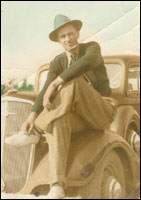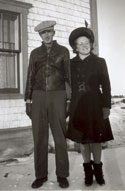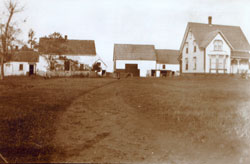 Harold Linkletter grew up in the rural community of Linkletter, named for his Loyalist ancestors who settled there in 1784. His father's farm was just four miles from the town of Summerside. When war broke out, he enlisted in the army and went to Charlottetown for basic training at Beach Grove. He became sick while there and the army decided to release him because as an only child he was needed on the family farm. In January 1941, he took a job for $10 a week as a dispatcher for the Airways Bus and Taxi Company, a new business created by W. E. Smallman to provide transportation to and from RCAF Station Summerside and later the Mount Pleasant training facility. Harold made enough money for a Ford half-ton truck, his first big purchase as a young man.
Harold Linkletter grew up in the rural community of Linkletter, named for his Loyalist ancestors who settled there in 1784. His father's farm was just four miles from the town of Summerside. When war broke out, he enlisted in the army and went to Charlottetown for basic training at Beach Grove. He became sick while there and the army decided to release him because as an only child he was needed on the family farm. In January 1941, he took a job for $10 a week as a dispatcher for the Airways Bus and Taxi Company, a new business created by W. E. Smallman to provide transportation to and from RCAF Station Summerside and later the Mount Pleasant training facility. Harold made enough money for a Ford half-ton truck, his first big purchase as a young man. In the fall of 1941, he left Mr. Smallman's employ and bought the auto specialty shop of Jack Lea. It was located in the building on the east corner of Water and Spring Streets. After about a year in business, Harold saw the importance of being with his father on the farm. He was also setting up his own household. In July 1942, he married Elma Large of Albany who had moved to Linkletter as a schoolteacher. They moved into a section of his grandparents' house, which within a few years they had to themselves. The electrical lines were not extended out to the community until 1945 so he remembers during the war taking a five-gallon can into one of the department stores in town to buy the kerosene that the family used in their lamps and lanterns. For war news, they used a battery radio to listen to CBC, CHGS, or CFCY. The Summerside Journal didn't come off the press until noon, so they subscribed to the Charlottetown Guardian, which came with the mailman before the noon meal.
In the fall of 1941, he left Mr. Smallman's employ and bought the auto specialty shop of Jack Lea. It was located in the building on the east corner of Water and Spring Streets. After about a year in business, Harold saw the importance of being with his father on the farm. He was also setting up his own household. In July 1942, he married Elma Large of Albany who had moved to Linkletter as a schoolteacher. They moved into a section of his grandparents' house, which within a few years they had to themselves. The electrical lines were not extended out to the community until 1945 so he remembers during the war taking a five-gallon can into one of the department stores in town to buy the kerosene that the family used in their lamps and lanterns. For war news, they used a battery radio to listen to CBC, CHGS, or CFCY. The Summerside Journal didn't come off the press until noon, so they subscribed to the Charlottetown Guardian, which came with the mailman before the noon meal. Harold doesn't recall experiencing much shortage of food or gasoline. Being on a farm meant lots of meat, eggs, dairy products and root crops. Farmers were entitled to commercial gasoline ration coupons so there was always enough fuel to get into town. It was not uncommon for neighbours to share or trade both the gasoline and food ration stamps. Generally speaking, he remembers the war years as being prosperous. He definitely felt that his family was "better off at the end, then at the beginning of the war."
| Related Articles | Related Images | Related Memories | Related Websites | Inflation Calculator |
| Home Page | Site Map | Contact Us | Wyatt Heritage Properties |


